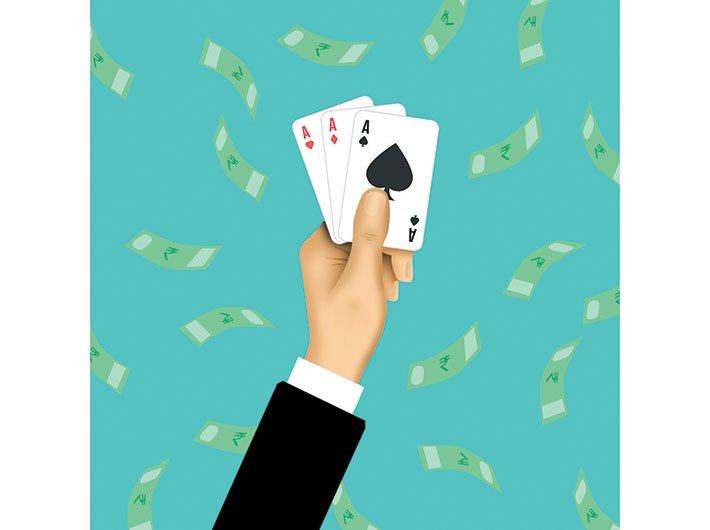Stock-trading is a gamble; the educated guesses that traders make are on a par with punts based on calculated odds. If stock-trading is okay, so is gambling
Life is a gamble everywhere. But in India, different states have different laws on gambling, lotteries, casinos. And betting on games, perfectly legal in many countries, is not allowed anywhere in India. That a betting network flourishes underground and is rich enough to fix matches has not made the central government think of legalising it, allowing licensed companies to register bets, offer odds, and let the occasional punter earn a jackpot while the government earn steady taxes.
With the arrival of the internet, among the most profitable sin sites are those offering porn and those offering games like rummy, teen patti, poker in many variants, backgammon, and so on. India has its share of them, many of them registered carefully to avoid legal hassles, like casinos which operate on cruise ships moored in international waters. Some states allow lotteries, some, like Sikkim, allow lotteries and casinos. Some state high courts have ruled that rummy and poker are games of skill -- which they actually aren't, for even with a perfect memory, an accurate ideas of the odds at any stage of a game, and prodigious brain power, a player would only be able to improve his chances, not influence the game decisively to his advantage at every play of card.
In all this confusion, there are 'miracle' stories every few months: of a poor labourer from West Bengal who buys a lottery ticket in Kerala and comes up a winner; of hoodied and shaded young men and women from India who have raked up millions of dollars playing poker; of a businessman uncle two or three streets away who has bought himself an SUV by betting on cricket.
Think
Some states allow lotteries, casinos, betting
. . .
Gambling happens despite the laws. Why not legalise it and tax it?
. . .
Stock-trading is a gamble; traders’ educated guesses are like punts based on calculated odds. If stock-trading is okay, so is gambling
How much better if the government legalised gambling, let those who want to bet and try their luck do so, and earn revenue from taxes? The money generated could be used for development. In any case, we already have state governments like Sikkim that are doing the same with casinos.
The argument that gambling is addictive and has been the ruin of many a family, of course, holds. But for every ruined gambling addict, there are those who are completely aware that the odds are loaded against them. They bet small, bet with discipline set up stop-loss agreements with themselves. Such grinders are happy with the occasional small prize, keep track of their wins and losses, and make sure they are in the positive. They know well that the lottery millionaire, well, is a one-in-a-billion story. And the gambling addict battles an addiction that is largely psychological, not physiological as in alcohol or drugs.
What gamblers do, actually, is no different from what stock brokers and investment bankers do. Quants like Nissim Nicholas Taleb have concluded that, despite all the math, the technical analysis, the candles and logarithmic graphs, the multi-functional mathematical models and algorithms, stock brokers are essentially gambling. More than anything else, they must kneel at the altar of luck rather than praise themselves or their skills for any success.
Since stock markets earnings are considered legal and taxed, there is no reason gambling should be treated the same way. Worth betting on?
Reality check
Gambling is a state subject, and individual state governments are open to take stances dictated by exigency. Public sentiment against gambling is so strong that it is unlikely that India will become Las Vegas any time soon. Mafias and money launderers tend to move in swiftly to control gambling places, so with lax law enforcement, India will be hard-pressed to handle the problems they create.
(This article appears in January 15, 2019 edition)

